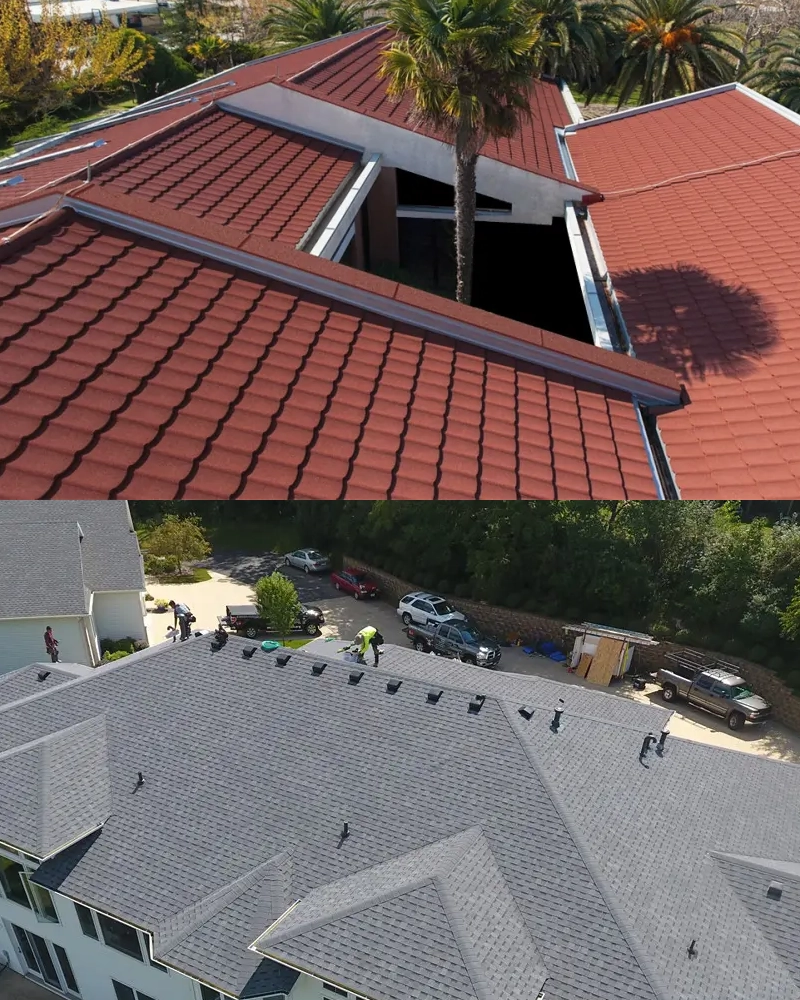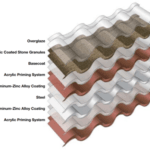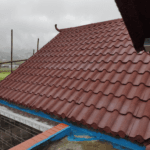When it comes to choosing the perfect roofing material for your home, there are several factors to consider. The durability, cost-effectiveness, and overall aesthetic appeal of the roof are all important aspects to keep in mind. Two popular options that homeowners often consider are asphalt shingles and metal roofs. In this comprehensive guide, we will explore the advantages and disadvantages of each roofing material to help you make an informed decision for your home.
Let’s start by looking at a table, we will visually understand the differences between them.
| Aspect | Metal Roof | Shingles |
|---|---|---|
| Material Cost | More expensive upfront, with a 1,700-square-foot metal roof typically costing $9,150–$16,743. | Less expensive upfront, with a 2,000-square-foot asphalt shingle roof typically costing $5,994–$9,791. |
| Material | Metal roofs are durable, resistant to damage and leaking, and can last from 40 to 70 years. They are also more energy-efficient, reflecting more heat than shingles. However, they can get dented by hail or flying debris. | Asphalt shingles are popular and aesthetically pleasing. They are less durable than metal roofs, needing replacement every 12 to 20 years. They absorb more heat than metal roofs. |
| Durability | Metal roofs are more durable and resistant to damage and leaking. They can last from 40 to 70 years. | Asphalt shingles need to be replaced every 12 to 20 years. They can absorb water and freeze in cold temperatures. |
| Maintenance Cost | Metal roofs require less maintenance than shingle roofs. However, they can get dented by hail or flying debris, which may require repair. | Shingle roofs require regular maintenance to ensure their longevity. They stand up to fire and storms, and repairs and installations are fast and easy. |
| Suitable Environment | Metal roofs are more resistant to extreme weather and are prevalent in coastal locations due to their superior performance in high wind. They are also more energy-efficient, reducing interior cooling costs by as much as 20%. | Shingle roofs can absorb water and freeze in cold temperatures, which may not be suitable for areas with extreme cold weather. They are less energy-efficient than metal roofs. |
If you need further visual comparisons or detailed information, feel free to contact us, and we will provide consultation free of charge.
Understanding Asphalt Shingles
Asphalt shingles have long been a popular choice for residential roofing due to their affordability and ease of installation. These shingles are typically made with a base material, such as felt or fiberglass, which is then coated with asphalt to provide waterproofing. The top surface of the shingles is embedded with mineral or ceramic granules that protect the asphalt coating from UV radiation and other environmental elements.
Advantages of Asphalt Shingles
- Cost-Effective: One of the major advantages of asphalt shingles is their affordability. They are generally the most cost-effective roofing option, making them a popular choice for budget-conscious homeowners.
- Easy Installation: Asphalt shingles are relatively easy to install, and most roofing contractors are familiar with the installation process. This makes it easier to find qualified professionals for the job.
- Variety of Styles: Asphalt shingles come in a wide range of styles and colors, allowing homeowners to choose a look that complements their home’s architectural style and personal preferences.
- Adequate Durability: While asphalt shingles may not be as durable as metal roofs, they still offer a decent lifespan of 15-20 years. With proper maintenance, they can withstand various weather conditions.
- Easy Maintenance: Asphalt shingles require minimal maintenance. Regular inspections and occasional repairs can help extend their lifespan and ensure optimal performance.
Disadvantages of Asphalt Shingles
- Limited Lifespan: Compared to metal roofs, asphalt shingles have a shorter lifespan. They typically need to be replaced every 15-20 years, which can add up to significant costs over time.
- Susceptible to Weather Damage: Asphalt shingles may be prone to damage in extreme weather conditions, such as high winds, hailstorms, and heavy snowfall. They can crack, curl, or lose granules, compromising their effectiveness.
- Less Energy Efficient: Asphalt shingles are not as energy-efficient as metal roofs. They tend to absorb heat from the sun, which can increase cooling costs during hot summer months.
- Environmental Impact: Asphalt shingles are petroleum-based products, contributing to the dependency on fossil fuels. Additionally, they generate a significant amount of waste, with millions of tons ending up in landfills each year.
Exploring Metal Roofs
Metal roofing has gained popularity in recent years due to its durability, longevity, and energy efficiency. While metal roofs may have a higher upfront cost compared to asphalt shingles, they offer several advantages that make them an attractive option for homeowners looking for a long-lasting roofing solution.
Advantages of Metal Roofs
- Exceptional Durability: Metal roofs are known for their durability and longevity. They can last 50 years or more, outlasting multiple asphalt shingle roofs.
- Minimal Maintenance: Metal roofs require minimal maintenance. They are resistant to cracking, warping, and other types of damage commonly associated with other roofing materials.
- Energy Efficiency: Metal roofs are highly energy-efficient. They reflect sunlight, reducing heat absorption and keeping the interior of the home cooler. This can lead to energy savings and lower cooling costs.
- Environmentally Friendly: Metal roofs are considered an environmentally friendly option. They are often made from recycled materials, and they can be fully recycled at the end of their lifespan. This reduces waste and promotes sustainability.
- Variety of Styles: Metal roofs come in a wide range of styles, including standing seam, corrugated panels, and metal shingles. This allows homeowners to choose a style that matches their desired aesthetic and architectural preferences.
- Weather Resistance: Metal roofs are highly resistant to extreme weather conditions, including high winds, hail, heavy snow, and even fire. They provide excellent protection for the home and can withstand the test of time.
Disadvantages of Metal Roofs
- Higher Initial Cost: Metal roofs generally have a higher upfront cost compared to asphalt shingles. However, considering their long lifespan and minimal maintenance requirements, they often provide a higher return on investment over time.
- Installation Complexity: Installing a metal roof requires specialized techniques and experienced professionals. It is more complex than installing asphalt shingles, which can lead to higher installation costs.
- Limited Qualified Installers: Finding qualified and experienced metal roofing contractors can be challenging. The installation process requires specific skills and knowledge, and there are fewer professionals trained in metal roof installation compared to asphalt shingle installation.
- Oil Canning: Oil canning, the visible waviness in the flat areas of metal roofing panels, can be a concern for some homeowners. While it does not affect the performance of the roof, it can impact the aesthetic appeal of the roof.
- Noise: Metal roofs can be noisier during heavy rain or hailstorms compared to other roofing materials. However, proper insulation and underlayment can help reduce the noise.
Factors to Consider Before Making a Decision
Before choosing between asphalt shingles and metal roofs, there are several important factors to consider. These include:
- Budget: Determine your budget and consider the long-term costs of each roofing material. While metal roofs may have a higher upfront cost, they often provide better value over time due to their longevity and energy efficiency.
- Climate: Consider the climate in your area. Metal roofs are highly durable and can withstand extreme weather conditions, making them a great choice for areas prone to hurricanes, high winds, or heavy snowfall.
- Aesthetic Preference: Think about the desired appearance of your roof. Both asphalt shingles and metal roofs come in various styles and colors, allowing you to choose a look that complements your home’s design.
- Maintenance: Consider the level of maintenance you are willing to undertake. Metal roofs require minimal maintenance, while asphalt shingles may need more frequent repairs and replacement.
- Environmental Impact: If sustainability and environmental impact are important to you, metal roofs are a more eco-friendly option. They are recyclable and made from recycled materials.
In conclusion, both asphalt shingles and metal roofs have their advantages and disadvantages. While asphalt shingles may be more affordable upfront, metal roofs offer superior durability, longevity, and energy efficiency. Consider your budget, climate, aesthetic preference, and environmental concerns when making a decision. Consulting with a professional roofing contractor can also provide valuable insights and help you make the best choice for your home.




